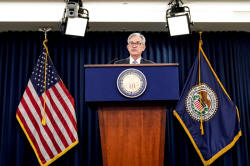Higher inflation, virus risks follow Fed's Powell to Congress
 Send a link to a friend
Send a link to a friend
 [July 14, 2021] By
Howard Schneider [July 14, 2021] By
Howard Schneider
WASHINGTON (Reuters) - U.S. Federal Reserve
Chair Jerome Powell begins two days of grilling by U.S. lawmakers on
Wednesday with the country facing faster-than-anticipated inflation and
a new rise in coronavirus infections, a combination that could pull the
Fed's outlook in opposing directions.
In sessions that begin at noon before the House Financial Services
committee, Powell in opening remarks and in answer to questions by
lawmakers will have to resolve a tension that has emerged just in the
four weeks since the Federal Open Market Committee met in June: Whether
the spread of the coronavirus Delta variant or inflation poses the
greater risk both to the economic recovery and to the Fed's response to
it.
The Fed's June meeting saw officials begin a move towards post-pandemic
policy, with some of them poised to tighten financial conditions sooner
to ensure inflation remains contained. Renewed coronavirus risks, if
they materialize, could push the Fed in the other direction of keeping
support for the recovery in place longer in case household and business
spending wanes amid new infections.

Falling Treasury bond yields have indicated concern among investors
about slowing U.S. growth, even as new data on prices this week showed
consumers paying appreciably more for goods and services from appliances
to fabric, beef and rent.
Graphic: Yields, long-run inflation outlook dip:
https://graphics.reuters.com/USA-FED/HEARING/
jznvnyabkpl/chart_eikon.jpg
Powell's view of inflation is likely to be a central focus among House
members on Wednesday and Senate Banking Committee members on Thursday,
all of them likely hearing from constituents about those rising bills.
In a report to Congress last week the Fed said that as the
"extraordinary circumstances" of the reopening subside, "supply and
demand should become better aligned, and inflation is widely expected to
move down."
Each month that inflation remains elevated, however, makes it harder for
Powell and the Fed to stick to that conviction. Some analysts feel the
moment has already passed.
Though the Fed wants inflation to run above its 2% target for a while to
offset years of weak pricing, "there is a threshold for their
tolerance," said Ambrose Crofton, a global market strategist with J.P.
Morgan Asset Management in London. "The consistent upside inflation
surprises of recent months suggest that it is no longer appropriate for
the Fed to have its foot firmly on the accelerator."
[to top of second column] |

Federal Reserve Chair Jerome Powell holds a news conference
following the Federal Open Market Committee meeting in Washington,
U.S., December 11, 2019. REUTERS/Joshua Roberts/File Photo

The "accelerator" includes $120 billion in monthly bond purchases as well as a
target short-term interest rate pinned near zero. Rates are likely to remain
unchanged perhaps into 2023 or longer. Discussion already has begun on when to
reduce the bond purchases.
RISING DELTA
That could be complicated by recent developments.
The Fed has said it will not reduce its bondbuying until it has seen substantial
further progress in regaining the roughly 7.5 million jobs still missing since
the onset of the pandemic in March 2020 - a threshold policymakers feel they are
likely to meet later this year.
That hinges, however, on continued reopening, recovery in the travel, leisure
and other "social" industries devastated by the health crisis, and willingness
of currently unemployed or homebound individuals to fill the record number of
jobs on offer.
When Powell last spoke about the economy at his post-meeting press conference on
June 16, daily coronavirus infections were heading to their recent low, and the
Fed dropped language from its policy statement that the pandemic "continues to
weigh on the economy."
Since then the Delta variant has pushed the 7-day moving average of cases from
11,000 to back above 15,000, with health officials concerned about the spread in
parts of the country where vaccination rates are low. The numbers are more
ominous globally.
If that continues, said ISI Evercore Vice Chairman Krishna Guha, it could leave
the Fed saddled with "sickflation," as individuals stay out of the labor market
in greater numbers than expected amid renewed virus spread, but supply chain
problems, rising wages for the workers who are in jobs, and other issues keep
inflation high.

"We expect Powell will strike a careful tone, reiterate that the Fed expects
strong growth but underscore that the pandemic still drives the economy," he
wrote.
(Reporting by Howard Schneider; Editing by Dan Burns and Andrea Ricci)
[© 2021 Thomson Reuters. All rights
reserved.] Copyright 2021 Reuters. All rights reserved. This material may not be published,
broadcast, rewritten or redistributed.
Thompson Reuters is solely responsible for this content. |